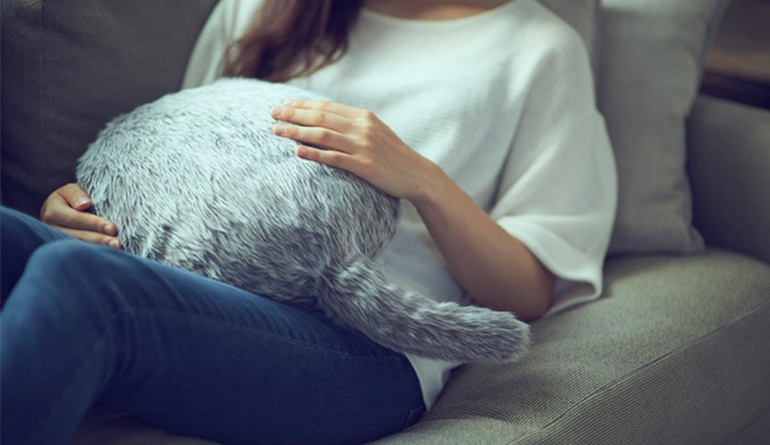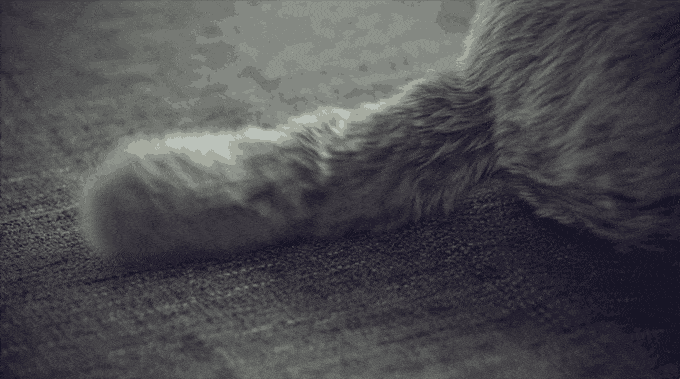Craving some cuddle time? Help is on the way! A Japanese company has invented a robotic pillow that offers therapeutic benefits similar to a hug or snuggle.
An Instant Success
Yukai Engineering, a Tokyo-based robot development company, launched a Kickstarter campaign back in October for its newest passion project, the Qoobo pillow. Within three months, the tailed cushion raised well over $100,000.
Qoobo’s success comes as no surprise. In addition to providing on-demand hugs, the pillow is apparently therapeutic. Just like a loyal pet, the tail waves when the cushion is caressed.
“It’s a comforting communication that warms your heart the way animals do,” the website notes. “[It] makes users feel as if they were interacting with live animals, and provides them with a sense of comfort.”
The Technology
In an effort to make the Qoobo as realistic as possible, Yukai’s robotics team continues to improve the product before the pillow is shipped to buyers next June. To do this, engineers are observing real animals to determine tail-wagging habits. Hidden beneath the furry exterior of the Qoobo is an intricate mechanism to emulate the movements of a lovable pet.
The company is well-aware that not all animal lovers can have pets, and saw the need for a solution.
“[We] wanted to use [our] expertise and experience in robotic engineering to help all people – including those with pet allergies and apartment dwellers who can’t own pets – enjoy the comfort that only animals can give them,” Yukai developers explain.
Is It a Dog or a Cat?
Rather than design a furry feline and/or a cuddly canine, Qoobo’s creators opted for an abstract creature that can be interpreted as any pet. No detail was overlooked—the size, weight, and texture were carefully considered to make a realistic, pet-like cushion. Buyers can choose from two colors—husky gray or French brown. Plus, the company plans to release a customizable cover template, so Qoobo owners can design additional covers in the print and fabric of their choice.
Therapeutic Benefits
Along with being cuddly and oddly cute, the pillow was invented to reduce stress and anxiety. It may even help depressed individuals, and folks who are lonely or simply in need of a hug.
Dokkyo Medical University Professor Nobuhiro Sakata is impressed with the pet/gadget.
“Qoobo intrigued me because the shape of the tail and the ways it moves just bring a smile to my face,” the professor said after trying the innovative pillow. “When you are stressed, I think this could comfort you and heal you. It’s a refreshing concept to have humans and a robot communicate only through tail movements without relying on sounds or facial expressions.”
He added, “As a user, you would project your emotions onto how the tail moves, and you could get a sense of healing from that. I felt it after using the pillow myself.”
Qoobo’s Target Audience
One demographic in need of some extra TLC is older adults. Qoobo creators believe isolated seniors could benefit greatly from the tailed cushion, which is readily available and ready to comfort at any given moment.
It’s not just seniors who are in need of companionship. In fact, one of Qoobo’s developers saw a need for the cuddly cushion and pitched the idea during an innovation camp. The developer admitted to wishing there was something comforting waiting at home after a long work day. “That was the beginning of Qoobo,” the company shares on its Kickstarter site.
Children and adults who struggle with insomnia and other sleep disorders, and those with occasional sleep issues, might also find comfort in snuggling a Qoobo.
As the company prepares to ship the pillow to anxious buyers, developers are anticipating a positive reaction. And if the Kickstarter campaign’s success is any indication, the pillow is bound to be a hit.
The company concludes: “We the staff at Yukai Engineering sincerely hope our innovation will help more people – including pet allergy sufferers and those who cannot own pets due to their circumstances – enjoy such connections with animals and feel warmth in their hearts.”


